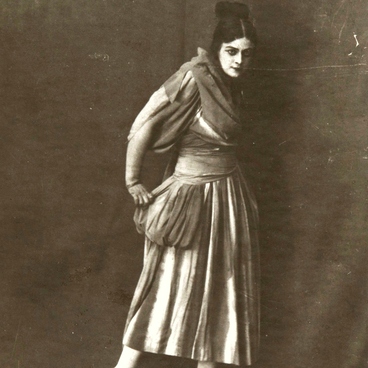Nikolay Verzhbitsky was a journalist, writer, and memoirist, the author of memoirs about Sergei Esenin. Since 1924, he lived in the Caucasus, working for the newspaper Zarya Vostoka. Verzhbitsky met Esenin in Moscow in the spring of 1921. Their friendship began after the poet’s arrival in Tiflis in the fall of 1924.
‘Esenin moved to the outskirts of the city, where I was renting an apartment at 15 Kodzhorskaya Street. The poet settled down here — away from temptations, from noisy guests, from the city hustle and bustle… I gave Yesenin a small room with a writing desk and a huge Urals-style chest, covered with a carpet. The second room served as a bedroom for me and my wife. According to the Tiflis custom, food was cooked on a brazier in the balcony; people ate, drank, and talked there. Several cherry plum trees and a flower garden grew in front of the balcony’, Verzhbitsky recalled.
Esenin’s poem In the Caucasus was written in Tiflis:
…Thinking now I’m found
Of all my great departed forebears.
For healed they were by guttural sound
Of all your vales and savage waters.
They from their foes were running here,
From comrades too they swift departed,
They wanted footsteps’ sound to hear
And see from heights ways yet uncharted…
There are five known letters from Esenin to Verzhbitsky, dating back to 1924–25. In June-July 1925, the poet wrote to his friend about his emotional problems: “Everything that I hoped for, what I dreamed about, goes to dust. Apparently, I can”t settle down in Moscow. Family life is not going well, I want to run. Where to? To the Caucasus! <…> My new family is unlikely to work out, everything here is so filled with the “great elder” (Esenin’s last wife, Sophia Tolstaya, was the granddaughter of Leo Tolstoy - ed. note). There is so much of him everywhere: on the tables, inside the tables, on the walls, and, it seems, even on the ceilings. Thus, there is no room for the living. And this suffocates me’.
‘Esenin moved to the outskirts of the city, where I was renting an apartment at 15 Kodzhorskaya Street. The poet settled down here — away from temptations, from noisy guests, from the city hustle and bustle… I gave Yesenin a small room with a writing desk and a huge Urals-style chest, covered with a carpet. The second room served as a bedroom for me and my wife. According to the Tiflis custom, food was cooked on a brazier in the balcony; people ate, drank, and talked there. Several cherry plum trees and a flower garden grew in front of the balcony’, Verzhbitsky recalled.
Esenin’s poem In the Caucasus was written in Tiflis:
…Thinking now I’m found
Of all my great departed forebears.
For healed they were by guttural sound
Of all your vales and savage waters.
They from their foes were running here,
From comrades too they swift departed,
They wanted footsteps’ sound to hear
And see from heights ways yet uncharted…
There are five known letters from Esenin to Verzhbitsky, dating back to 1924–25. In June-July 1925, the poet wrote to his friend about his emotional problems: “Everything that I hoped for, what I dreamed about, goes to dust. Apparently, I can”t settle down in Moscow. Family life is not going well, I want to run. Where to? To the Caucasus! <…> My new family is unlikely to work out, everything here is so filled with the “great elder” (Esenin’s last wife, Sophia Tolstaya, was the granddaughter of Leo Tolstoy - ed. note). There is so much of him everywhere: on the tables, inside the tables, on the walls, and, it seems, even on the ceilings. Thus, there is no room for the living. And this suffocates me’.




